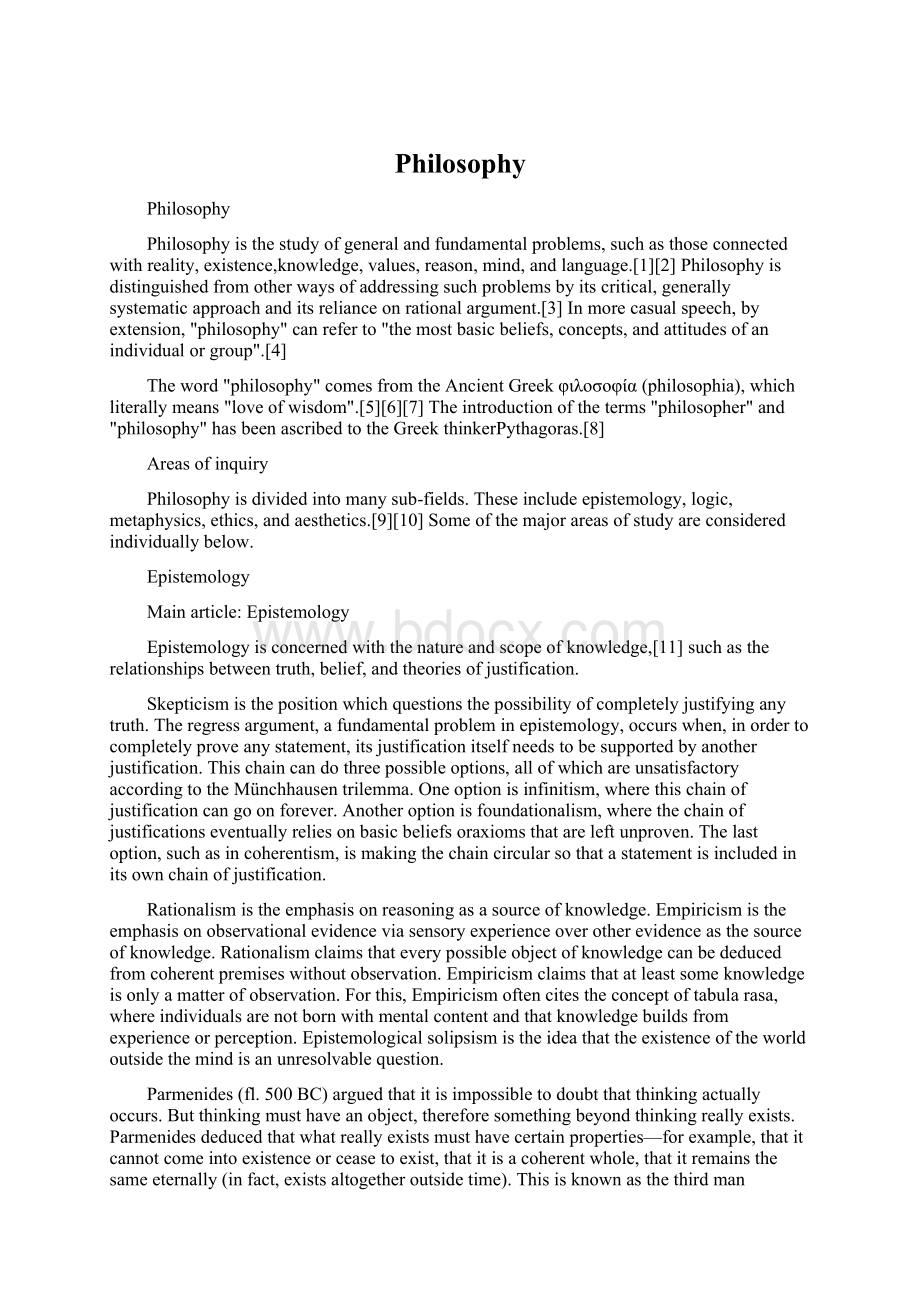Philosophy.docx
《Philosophy.docx》由会员分享,可在线阅读,更多相关《Philosophy.docx(19页珍藏版)》请在冰豆网上搜索。

Philosophy
Philosophy
Philosophy isthestudyofgeneralandfundamentalproblems,suchasthoseconnectedwith reality, existence,knowledge, values, reason, mind,and language.[1][2] Philosophyisdistinguishedfromotherwaysofaddressingsuchproblemsbyitscritical,generallysystematicapproachanditsrelianceon rationalargument.[3] Inmorecasualspeech,byextension,"philosophy"canreferto"themostbasicbeliefs,concepts,andattitudesofanindividualorgroup".[4]
Theword"philosophy"comesfromthe AncientGreek φιλοσοφία(philosophia),whichliterallymeans"loveofwisdom".[5][6][7] Theintroductionoftheterms"philosopher"and"philosophy"hasbeenascribedtotheGreekthinkerPythagoras.[8]
Areasofinquiry
Philosophyisdividedintomanysub-fields.Theseincludeepistemology,logic,metaphysics,ethics,andaesthetics.[9][10] Someofthemajorareasofstudyareconsideredindividuallybelow.
Epistemology
Mainarticle:
Epistemology
Epistemologyisconcernedwiththenatureandscopeofknowledge,[11] suchastherelationshipsbetween truth, belief,and theoriesofjustification.
Skepticism isthepositionwhichquestionsthepossibilityofcompletelyjustifyinganytruth.The regressargument,afundamentalprobleminepistemology,occurswhen,inordertocompletelyproveanystatement,itsjustificationitselfneedstobesupportedbyanotherjustification.Thischaincandothreepossibleoptions,allofwhichareunsatisfactoryaccordingtothe Münchhausentrilemma.Oneoptionis infinitism,wherethischainofjustificationcangoonforever.Anotheroptionis foundationalism,wherethechainofjustificationseventuallyrelieson basicbeliefs oraxioms thatareleftunproven.Thelastoption,suchasin coherentism,ismakingthechain circular sothatastatementisincludedinitsownchainofjustification.
Rationalism istheemphasisonreasoningasasourceofknowledge. Empiricism istheemphasisonobservationalevidenceviasensoryexperienceoverotherevidenceasthesourceofknowledge.Rationalismclaimsthateverypossibleobjectofknowledgecanbededucedfromcoherentpremiseswithoutobservation.Empiricismclaimsthatatleastsomeknowledgeisonlyamatterofobservation.Forthis,Empiricismoftencitestheconceptof tabularasa,whereindividualsarenotbornwith mentalcontent andthatknowledgebuildsfromexperienceorperception. Epistemologicalsolipsism istheideathattheexistenceoftheworldoutsidethemindisanunresolvablequestion.
Parmenides (fl.500BC)arguedthatitisimpossibletodoubtthatthinkingactuallyoccurs.Butthinkingmusthaveanobject,thereforesomething beyond thinkingreallyexists.Parmenidesdeducedthatwhatreallyexistsmusthavecertainproperties—forexample,thatitcannotcomeintoexistenceorceasetoexist,thatitisacoherentwhole,thatitremainsthesameeternally(infact,existsaltogetheroutsidetime).Thisisknownasthe thirdmanargument. Plato(427–347BC)combinedrationalismwithaformof realism.Thephilosopher'sworkistoconsiderbeing,andtheessence(ousia)ofthings.Butthecharacteristicofessencesisthattheyareuniversal.Thenatureofaman,atriangle,atree,appliestoallmen,alltriangles,alltrees.Platoarguedthattheseessencesaremind-independent"forms",thathumans(butparticularlyphilosophers)cancometoknowbyreason,andbyignoringthedistractionsofsense-perception.
Modernrationalismbeginswith Descartes.Reflectiononthenatureofperceptualexperience,aswellasscientificdiscoveriesinphysiologyandoptics,ledDescartes(andalso Locke)totheviewthatwearedirectlyawareofideas,ratherthanobjects.Thisviewgaverisetothreequestions:
1.Isanideaatruecopyoftherealthingthatitrepresents?
Sensationisnotadirectinteractionbetweenbodilyobjectsandoursense,butisaphysiologicalprocessinvolvingrepresentation(forexample,animageontheretina).Lockethoughtthata"secondaryquality"suchasasensationofgreencouldinnowayresemblethearrangementofparticlesinmatterthatgotoproducethissensation,althoughhethoughtthat"primaryqualities"suchasshape,size,number,werereallyinobjects.
2.Howcanphysicalobjectssuchaschairsandtables,orevenphysiologicalprocessesinthebrain,giverisetomentalitemssuchasideas?
Thisispartofwhatbecameknownasthe mind-bodyproblem.
3.Ifallthecontentsofawarenessareideas,howcanweknowthatanythingexistsapartfromideas?
Descartestriedtoaddressthelastproblembyreason.Hebegan,echoingParmenides,withaprinciplethathethoughtcouldnotcoherentlybedenied:
I think,thereforeI am (oftengiveninhisoriginalLatin:
Cogitoergosum).Fromthisprinciple,Descarteswentontoconstructacompletesystemofknowledge(whichinvolvesprovingthe existenceofGod,using,amongothermeans,aversionofthe ontologicalargument).[12] Hisviewthatreasonalonecouldyieldsubstantialtruthsaboutrealitystronglyinfluencedthosephilosophersusuallyconsideredmodernrationalists(suchas BaruchSpinoza, GottfriedLeibniz,and ChristianWolff),whileprovokingcriticismfromotherphilosopherswhohaveretrospectivelycometobegroupedtogetherasempiricists.
Logic
Mainarticle:
Logic
Logicisthestudyoftheprinciplesofcorrect reasoning. Arguments useeitherdeductivereasoningorinductivereasoning. Deductivereasoning iswhen,givencertainstatements(called premises),otherstatements(calledconclusions)are unavoidablyimplied. Rulesofinferences frompremisesincludethemostpopularmethod, modusponens,wheregiven“A”and“IfAthenB”,then“B”mustbeconcluded.Acommonconventionforadeductiveargumentisthe syllogism.Anargumentistermed valid ifitsconclusiondoesindeedfollowfromitspremises,whetherthepremisesaretrueornot,whileanargumentis sound ifitsconclusionfollowsfrompremisesthataretrue. Propositionallogic usespremisesthatarepropositions,whichare declarations thatareeithertrueorfalse,while predicatelogic usesmorecomplexpremisescalled formulae thatcontainvariables.Thesecanbeassignedvaluesorcanbe quantified astowhentheyapplywiththe universalquantifier (alwaysapply)orthe existentialquantifier (appliesatleastonce). Inductivereasoning makesconclusionsorgeneralizationsbasedon probabilisticreasoning.Forexample,if“90%ofhumansareright-handed”and“Joeishuman”then“Joeisprobablyright-handed”.Fieldsinlogicinclude mathematicallogic (formalsymboliclogic)and philosophicallogic.
Metaphysics
Mainarticle:
Metaphysics
Metaphysicsisthestudyofthemostgeneralfeaturesof reality,suchas existence, time,therelationshipbetween mind and body, objects andtheirproperties,wholesandtheirparts,events,processes,and causation.Traditionalbranchesofmetaphysicsinclude cosmology,thestudyofthe worldinitsentirety,and ontology,thestudyof being.
Withinmetaphysicsitselfthereareawiderangeofdifferingphilosophical theories. Idealism,forexample,isthebeliefthatrealityismentallyconstructedorotherwiseimmaterialwhile realism holdsthatreality,oratleastsomepartofit,existsindependentlyofthemind. Subjectiveidealism describesobjectsasnomorethancollectionsor"bundles"ofsensedataintheperceiver.The18thcenturyphilosopher GeorgeBerkeleycontendedthatexistenceisfundamentallytiedtoperceptionwiththephrase Esseestautpercipiautpercipere or"Tobeistobeperceivedortoperceive".[13]
Inadditiontotheaforementionedviews,however,thereisalsoanontological dichotomy withinmetaphysicsbetweentheconceptsofparticularsanduniversalsaswell. Particulars arethoseobjectsthataresaidtoexistinspaceandtime,asopposedto abstractobjects,suchasnumbers.Universals arepropertiesheldbymultipleparticulars,suchasrednessoragender.Thetypeof existence,ifany,ofuniversalsandabstractobjectsisanissueofserious debate withinmetaphysicalphilosophy. Realism isthephilosophicalpositionthatuniversalsdoinfactexist,whilenominalism isthenegation,ordenialofuniversals,abstractobjects,orboth.[14] Conceptualism holdsthatuniversalsexist,butonlywithinthemind'sperception.[15]
Thequestionofwhetherornot existence isa predicate hasbeendiscussedsincetheEarlyModernperiod. Essence isthesetofattributesthatmakeanobjectwhatitfundamentallyisandwithoutwhichitlosesits identity.Essenceiscontrastedwith accident:
apropertythatthesubstancehascontingently,withoutwhichthesubstancecanstillretainitsidentity.
Moralandpoliticalphilosophy
Mainarticles:
Ethics and Politicalphilosophy
Ethics,or"moralphilosophy,"isconcernedprimarilywiththequestionofthebestwaytolive,andsecondarily,concerningthequestionofwhetherthisquestioncanbeanswered.Themainbranchesofethicsare meta-ethics, normativeethics,and appliedethics.Meta-ethicsconcernsthenatureofethicalthought,suchastheoriginsofthewordsgoodandbad,andoriginsofothercomparativewordsofvariousethicalsystems,whetherthereareabsoluteethicaltruths,andhowsuchtruthscouldbeknown.Normativeethicsaremoreconcernedwiththequestionsofhowoneoughttoact,andwhattherightcourseofactionis.Thisiswheremostethicaltheoriesaregenerated.Lastly,appliedethicsgobeyondtheoryandstepintorealworldethicalpractice,suchasquestionsofwhetherornotabortioniscorrect.Ethicsisalsoassociatedwiththeideaof morality,andthetwoareofteninterchangeable.
Onedebatethathascommandedtheattentionofethicistsinthemodernerahasbeenbetween consequentialism (actionsaretobemorallyevaluatedsolelybytheir consequ